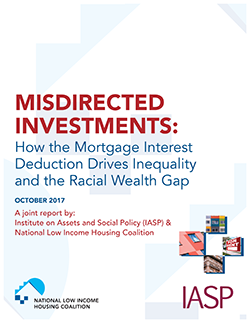Minority Households Do Not Receive Fair Share of Mortgage Interest Deduction
Oct 23, 2017
 A report released by NLIHC and the Institute on Assets and Social Policy (IASP) at Brandeis University, Misdirected Investments: How the Mortgage Interest Deduction Drives Inequality and the Racial Wealth Gap, shows that the mortgage interested deduction (MID) disproportionately benefits white households over African American and Latino households.
A report released by NLIHC and the Institute on Assets and Social Policy (IASP) at Brandeis University, Misdirected Investments: How the Mortgage Interest Deduction Drives Inequality and the Racial Wealth Gap, shows that the mortgage interested deduction (MID) disproportionately benefits white households over African American and Latino households.
White households receive nearly 78% of the MID’s benefits even though they account for only 67% of all households. African American and Latino households each account for approximately 13% of the nation’s households, but receive only 6% and 7% of MID benefits. If the distribution of MID benefits was racially equitable, African-American would receive $4.8 billion in additional financial benefit and Latino households $4.1 billion more.
The MID is an annual federal expenditure of $70 billion per year that primarily goes to higher income homeowners. White households are more likely to benefit from the MID because they are more likely to own a home, have larger mortgages, and earn higher incomes. Renters receive no benefit from the MID, and many lower and moderate income homeowners do not benefit from the MID because they claim the standard deduction.
The report proposes reforms that would provide greater equity in the distribution of federal housing expenditures. These reforms include converting the deduction to a tax credit, which would provide all mortgaged homeowners with tax relief regardless of their income, and lowering the cap on the amount of mortgage eligible for a tax break from $1 million to $500,000. The savings from these two reforms should be invested in housing for the lowest income households most in need of assistance through solutions like the national Housing Trust Fund, Housing Choice Vouchers, or a renter’s tax credit.
Misdirected Investments: How the Mortgage Interest Deduction Drives Inequality and the Racial Wealth Gap is available at: http://bit.ly/2gIy7LZ